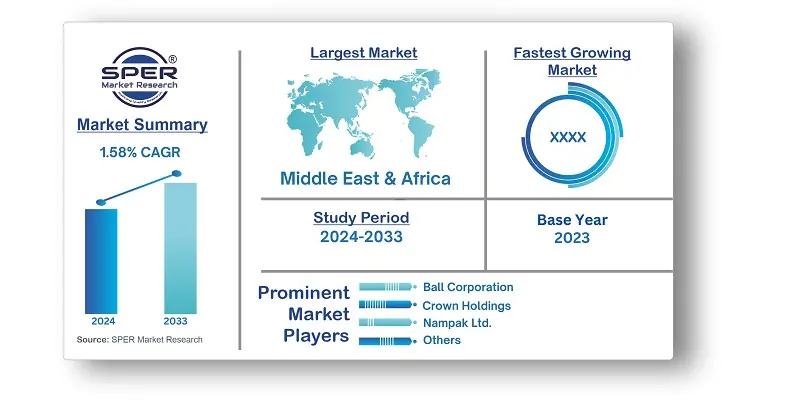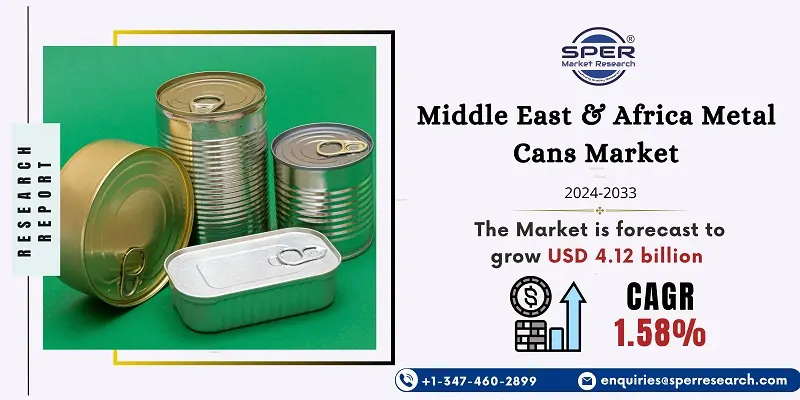
Middle East & Africa Metal Cans Market Trends, Share, Size, Demand, Revenue and Future Outlook
Middle East & Africa Metal Cans Market Growth, Size, Trends Analysis- By Material, By Type- Regional Outlook, Competitive Strategies and Segment Forecast to 2033
| Published: Dec-2024 | Report ID: PACK2423 | Pages: 1 - 159 | Formats*: |
| Category : Packaging | |||
- July 2019: Nampak, the biggest packaging firm in Africa, intends to switch from plastic beverage bottles to paperboard cartons and aluminum cans. Nampak is looking for new ecologically friendly substitutes for its packaging products as consumer opposition to plastic packaging grows.


| Report Metric | Details |
| Market size available for years | 2020-2033 |
| Base year considered | 2023 |
| Forecast period | 2024-2033 |
| Segments covered | By Material, By Type |
| Regions covered | Qatar, Saudi Arabia, United Arab Emirates, Egypt, Morocco, Nigeria, South Africa, Rest of Middle-East and Africa. |
| Companies Covered | ARYUM Metal Alüminyum Tüp, Ball Corporation, Crown Holdings, SAPIN SA, Avon Crowncaps & Containers Nigeria Limited, Nampak Ltd., Can-Pack Middle East, Middle East Metal Can LLC (Trinity Holdings), Gulf Cans Industries, CanSmart (Pty) Ltd., and others. |
- Food and Beverage Industry
- Pharmaceutical Industry
- Personal Care and Cosmetics Industry
- Household Products Industry
- Automotive Industry
- Industrial Packaging Sector
- Retailers and Distributors
| By Material: | |
| By Type: |
- Middle East & Africa Metal Cans Market Size (FY’2024-FY’2033)
- Overview of Middle East & Africa Metal Cans Market
- Segmentation of Middle East & Africa Metal Cans Market By Material (Aluminium Cans, Steel/Tin Cans)
- Segmentation of Middle East & Africa Metal Cans Market By Type (Beverages Cans, Food Cans, Aerosol Cans, Others)
- Expansion Analysis of Middle East & Africa Metal Cans Market
- Problems and Obstacles in Middle East & Africa Metal Cans Market
- Competitive Landscape in the Middle East & Africa Metal Cans Market
- Impact of COVID-19 and Demonetization on Middle East & Africa Metal Cans Market
- Details on Current Investment in Middle East & Africa Metal Cans Market
- Competitive Analysis of Middle East & Africa Metal Cans Market
- Prominent Players in the Middle East & Africa Metal Cans Market
- SWOT Analysis of Middle East & Africa Metal Cans Market
- Middle East & Africa Metal Cans Market Future Outlook and Projections (FY’2024-FY’2033)
- Recommendations from Analyst
1.1. Scope of the report1.2. Market segment analysis
2.1. Research data source
2.1.1. Secondary Data2.1.2. Primary Data2.1.3. SPERs internal database2.1.4. Premium insight from KOLs
2.2. Market size estimation
2.2.1. Top-down and Bottom-up approach
2.3. Data triangulation
4.1. Driver, Restraint, Opportunity and Challenges analysis
4.1.1. Drivers4.1.2. Restraints4.1.3. Opportunities4.1.4. Challenges
4.2. COVID-19 Impacts of the Middle East & Africa Metal Cans Market
5.1. SWOT Analysis
5.1.1. Strengths5.1.2. Weaknesses5.1.3. Opportunities5.1.4. Threats
5.2. PESTEL Analysis
5.2.1. Political Landscape5.2.2. Economic Landscape5.2.3. Social Landscape5.2.4. Technological Landscape5.2.5. Environmental Landscape5.2.6. Legal Landscape
5.3. PORTERs Five Forces
5.3.1. Bargaining power of suppliers5.3.2. Bargaining power of buyers5.3.3. Threat of Substitute5.3.4. Threat of new entrant5.3.5. Competitive rivalry
5.4. Heat Map Analysis
6.1. Middle East & Africa Metal Cans Market Manufacturing Base Distribution, Sales Area, Product Type6.2. Mergers & Acquisitions, Partnerships, Product Launch, and Collaboration in Middle East & Africa Metal Cans Market
7.1. Middle East & Africa Metal Cans Market Size, Share and Forecast, By Material, 2020-20267.2. Middle East & Africa Metal Cans Market Size, Share and Forecast, By Material, 2027-20337.3. Aluminium Cans7.4. Steel/Tin Cans
8.1. Middle East & Africa Metal Cans Market Size, Share and Forecast, By Type, 2020-20268.2. Middle East & Africa Metal Cans Market Size, Share and Forecast, By Type, 2027-20338.3. Beverages Cans8.4. Food Cans8.5. Aerosol Cans8.6. Others
9.1. Middle East & Africa Metal Cans Market Size and Market Share
10.1. Middle East & Africa Metal Cans Market Size and Market Share By Region (2020-2026)10.2. Middle East & Africa Metal Cans Market Size and Market Share By Region (2027-2033)10.3. Qatar10.4. Saudi Arabia10.5. United Arab Emirates10.6. Egypt10.7. Morocco10.8. Nigeria10.9. South Africa10.10. Rest of Middle-East and Africa
11.1. ARYUM Metal Alüminyum Tüp
11.1.1. Company details11.1.2. Financial outlook11.1.3. Product summary11.1.4. Recent developments
11.2. Ball Corporation
11.2.1. Company details11.2.2. Financial outlook11.2.3. Product summary11.2.4. Recent developments
11.3. Crown Holdings
11.3.1. Company details11.3.2. Financial outlook11.3.3. Product summary11.3.4. Recent developments
11.4. SAPIN SA
11.4.1. Company details11.4.2. Financial outlook11.4.3. Product summary11.4.4. Recent developments
11.5. Avon Crowncaps & Containers Nigeria Limited
11.5.1. Company details11.5.2. Financial outlook11.5.3. Product summary11.5.4. Recent developments
11.6. Nampak Ltd.
11.6.1. Company details11.6.2. Financial outlook11.6.3. Product summary11.6.4. Recent developments
11.7. Can-Pack Middle East
11.7.1. Company details11.7.2. Financial outlook11.7.3. Product summary11.7.4. Recent developments
11.8. Middle East Metal Can LLC (Trinity Holdings)
11.8.1. Company details11.8.2. Financial outlook11.8.3. Product summary11.8.4. Recent developments
11.9. Gulf Cans Industries
11.9.1. Company details11.9.2. Financial outlook11.9.3. Product summary11.9.4. Recent developments
11.10. CanSmart (Pty) Ltd.
11.10.1. Company details11.10.2. Financial outlook11.10.3. Product summary11.10.4. Recent developments
11.11. Others
SPER Market Research’s methodology uses great emphasis on primary research to ensure that the market intelligence insights are up to date, reliable and accurate. Primary interviews are done with players involved in each phase of a supply chain to analyze the market forecasting. The secondary research method is used to help you fully understand how the future markets and the spending patterns look likes.
The report is based on in-depth qualitative and quantitative analysis of the Product Market. The quantitative analysis involves the application of various projection and sampling techniques. The qualitative analysis involves primary interviews, surveys, and vendor briefings. The data gathered as a result of these processes are validated through experts opinion. Our research methodology entails an ideal mixture of primary and secondary initiatives.



Frequently Asked Questions About This Report
PLACE AN ORDER
Year End Discount
Sample Report
Pre-Purchase Inquiry
NEED CUSTOMIZATION?
Request CustomizationCALL OR EMAIL US
100% Secure Payment






Related Reports
Our Global Clients
Our data-driven insights have influenced the strategy of 200+ reputed companies across the globe.






















